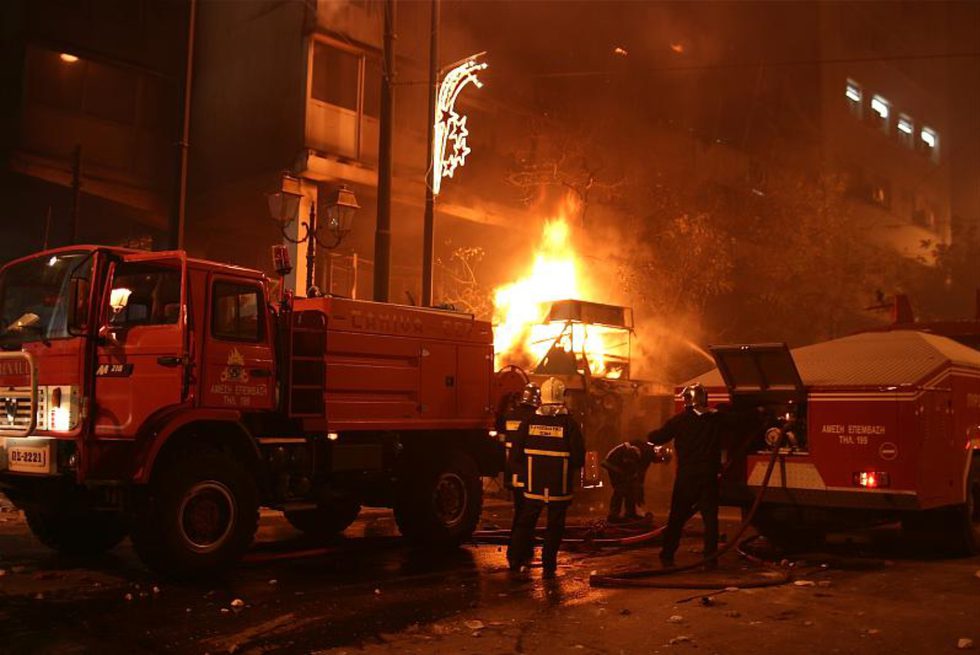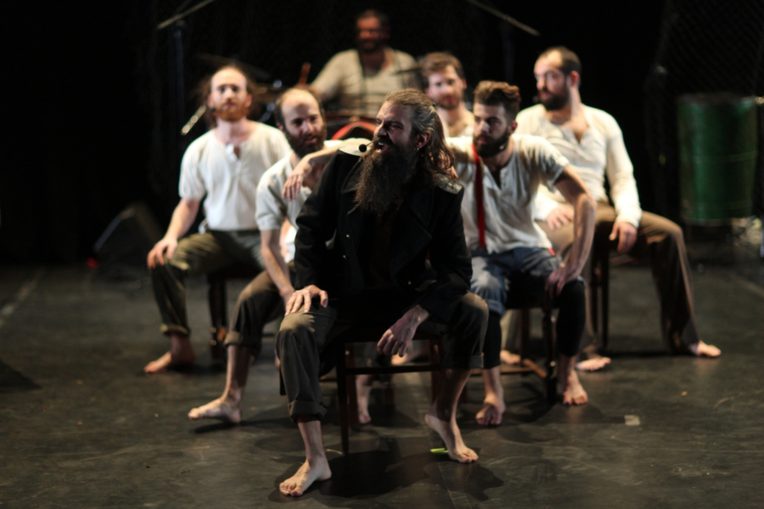Never Alone/Find the Way
From the Series: Greece is Burning
From the Series: Greece is Burning

January 2016: six years now living under a memorandum of understanding with Greece’s creditors. One year following Alexis Tsipras’s rise to power with the Syriza/ANEL government and in the midst of multiple fronts, disappointments, and annulments. A large part of the country’s population entrapped within its own choices of January, July, and September 2015. Conversations imprisoned within the stale dichotomies of left/right, progressive/conservative, memorandum/antimemorandum, old/new, and public/private. Marginalized imagination and just enough reason tailored for stagnation and making ends meet. The microphysics of entrapment no less present in the petty bourgeois mentality of the Greek family—provincial, urban, and middle class, indiscriminately.
It is in such circumstances that people most need something forceful, something moving and simultaneously optimistic, something to shake them up and help them break the chains. KollektivΑ’s theatrical concept album “The Ballad of Reading Gaol” had precisely that effect. KollektivΑ is a Greek rock band, founded in 2009. In collaboration with director and choreographer Tassos Bekiaris and playwright Christina Mitropoulou, KollektivA performed “The Ballad of Reading Gaol” in January 2016 at the Michael Cacoyannis Foundation in Athens. The album and play were inspired by the eponymous poem written by Oscar Wilde after his release from prison in 1897. For some, the effect of the performance lasted for the mere duration of the show. Others took a feeling of empowerment with them to their homes, to work, and to their everyday lives. How did this come about?
Answering this question is no easy task and my words cannot approximate the lived experience of this play, but I will attempt to enumerate some of the production’s key elements. The band and the actors, by the end of the show, had become one. Their chemistry was apparent—it was one of those things that you cannot define, but that you recognize when you see it, as they say. The leading character, Thanassis (whose name, Athanassios, literally means “immortal”) began by singing: “Us, all of us, my God, how we dared / the prison’s shame to quell / Us, all of us with a common dream / this wall we may demolish.” The rest of the troupe added its own interpretation to the lyrics through movement and rhythmic utterances. From the get-go, the audience was relieved of their usual expectations for a concert or play. This was the first liberating moment of the production and, as often happens, it opened up the venue to what was to follow.

“The path is here / life is here / the World is ours / it is our life,” sang Thanassis. Meanwhile, the rest of the actors on stage, as if in dialogue with this verse, discussed the beginnings of yet another liberation: “Is this what started the whole thing? This tiny piece of paper? From then on, the Soldier severed every bond with the old World. His thoughts became uninhibited.” By the end of the show the audience discovered what was written on the Soldier’s tiny piece of paper: on the front side, “Never alone,” and on the reverse, “Find the way.”
Every scene contained elements of imprisonment and deliverance, disappointment and hope, catastrophe and salvation, mortality and natality. The contradictions coexisted in harmony, and KollektivA’s hard rock music found harmony, too, with the sounds of distant musical traditions that the band skillfully integrated. This modern tragedy, disguised as a rock opera, shook me up—as well as the rest of the audience.
KollektivA’s “Ballad of Reading Gaol” took place amidst the most depressing and polarized period in Greece during my lifetime, with unemployment above 25 percent, skilled and unskilled Greeks emigrating abroad, capital controls, economic recession, and social upheaval in the streets. But when I walked out of the theater, I was hopeful. “Man is born free, and everywhere he is in chains,” Jean-Jacques Rousseau wrote in the opening lines of The Social Contract, and these words came to mind. But the story of the defiant Prometheus, captured in Aeschylus’s classical tragedy, was pushing Rousseau’s words of wisdom to the side. For a moment, I stood and contemplated the critical part that contradictions play in modern Greek life and politics. “The Ballad of Reading Gaol” embraced such contradictions and moved beyond their adjudication. Maybe this is why the performance captivated the audience. Even though this play transcended time and space, it was still, in an appealing way, historically and culturally specific.